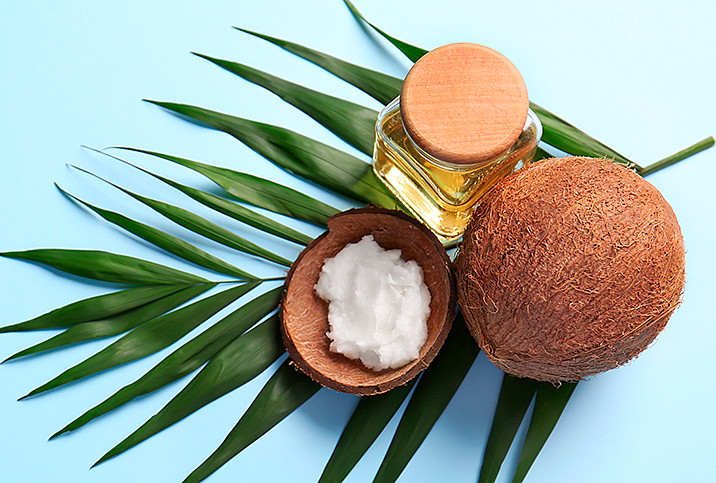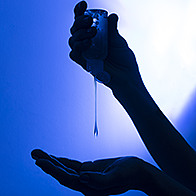What You Should Know Before You Put Coconut Oil in Your Vagina

Coconut oil is touted by many as a healthy, all-natural product with an abundance of uses—everything from an alternative to butter in vegan dishes to an organic moisturizer for skin and hair. One suggestion making the rounds in recent years is using the oil as a vaginal lubricant.
If you're thinking about trading in your tried-and-true lube for coconut oil, here's what the experts want you to know.
The benefits and risks of putting coconut oil in your vagina
Kecia Gaither, M.D., double board-certified in OB-GYN and Maternal-Fetal Medicine, and director of Perinatal Services at NYC Health + Hospitals/Lincoln in the Bronx, told us coconut oil in its purest form makes an excellent moisturizer for external genitalia (your vulva).
As for using it inside your vagina, there have been no scientific studies on the safety or effectiveness of using coconut oil as lube. But studies have shown it to be generally safe for use on the skin, and anecdotal reports from people using it as lube or to alleviate vaginal dryness have been positive.
"Coconut oil is an all-natural alternative to traditional lubrication," said Peace Nwegbo-Banks, M.D., a board-certified OB-GYN at Serenity Women's Health and Med Spa in Pearland, Texas. Nwegbo-Banks said other positive aspects of using coconut oil as a lubricant include its moisturizing abilities and its antimicrobial, antifungal and antioxidant properties. Additionally, the oil has a good amount of "slip" for intercourse, and can be easily applied to the genitals prior to and during intercourse.
However, Gaither warned, there are a few potential risks you should be aware of before you start smearing coconut oil on your genitals.
Watch for an allergic reaction or infection
Although allergic reactions to natural oils are rare, Nwegbo-Banks suggests doing a patch test by rubbing some on your arm and watching the area for a day or so to make sure you don't have an adverse reaction.
'It can affect the balance of vaginal microbes and alter vaginal acid-base balance or pH, [...] could lead to overgrowth of bacteria, which may lead to various disbalance-related conditions, such as bacterial vaginosis.'
Alex Polyakov, MBBS, FRANZCOG, a senior gynecologist and clinical lecturer at the University of Melbourne in Australia, said to keep an eye out for the following reactions during your patch test, which indicate an allergy:
- Itching or burning
- Abnormal discharge
- Swelling
- Redness
Also be on the lookout for more severe reactions, such as anaphylaxis (shortness of breath, hives, angioedema). If you experience anaphylaxis, go to the hospital immediately.
Coconut oil degrades latex
You should never use coconut oil with latex condoms. Oil and petroleum-based products can weaken latex, which will leave the condom more prone to breakage and less effective in preventing pregnancy and protecting you from sexually transmitted diseases and infections (STDs/STIs).
So, if you're planning to lube up with coconut oil, opt for a polyurethane condom for protection.
Can coconut oil cause yeast infections?
Maintaining a healthy vagina is important, and that means not disrupting your vaginal pH. Unfortunately, all sorts of things can mess with your vaginal microbiome, and that list might include coconut oil (at least, for some people).
"Coconut oil has an alkaline pH (>7), while the vagina has an acidic pH (<7)," Nwegbo-Banks explained. "In some, this difference can destabilize the pH in the vagina, thus causing an increased risk of bacterial vaginosis (BV) and yeast infections."
"It can affect the balance of vaginal microbes and alter vaginal acid-base balance or pH," Polyakov agreed. "This could lead to overgrowth of bacteria, which may lead to various disbalance-related conditions, such as bacterial vaginosis."
"In addition," Polyakov continued, "altered pH and vaginal bacteria changes may predispose [you] to infection with candida and result in symptomatic thrush infection."
So, if you're already prone to yeast infections or other vaginal conditions, it might be best to avoid coconut oil.
What to know before you begin using coconut oil vaginally
If you've decided you'd like to add coconut oil to your bedroom activities, be sure you pick up the "unrefined" type.
Coconut oil comes in two varieties, refined and unrefined, and Nwegbo-Banks recommends adding "unrefined virgin coconut oil" to your shopping list. This option is typically free of potentially harmful additives, such as deodorizing agents, preservatives and artificial colors.
Now that you've got it, how exactly do you use it?
If you're already familiar with coconut oil, then you know that at room temperature, it's a white, solid mass that usually comes in a little tub. Meanwhile, your typical lube is in liquid or jelly form and is easily dispensed from a squeezable container.
Just like you, coconut oil needs a little love to get it in the mood. Solid coconut oil becomes liquid at body temperature, so Polyakov suggests heating the oil by gently rubbing it between your hands or directly onto your genitals. Though, if all of that sounds like a lot, you can purchase unrefined coconut oil in liquid form instead, Polyakov said.
The liquid form may also be helpful for those with limited mobility. As with any new product, it's important to take your unique physical abilities into account. I'm limited to one arm, and an upper extremity disability is one of those things that doesn't pair well with coconut oil as a lubricant. If you're using a solid form, it's a lot harder to warm the oil between your hands (depending on your level of impairment).
Although, if you opt for a liquid form, you might experience a challenge when it comes to dispensing it neatly and wind up with more of it on your sheets than on you. But as with all things, everyone is different, so it's important not to cross it off the list simply because of a disability. These are just a few factors to keep in mind if you want to look at all the pros and cons that may affect you.
Ultimately, coconut oil is a safe and reasonable lubricant option. But, as with anything you might be unsure about using on your body, it's always good to discuss it with your healthcare provider.




















